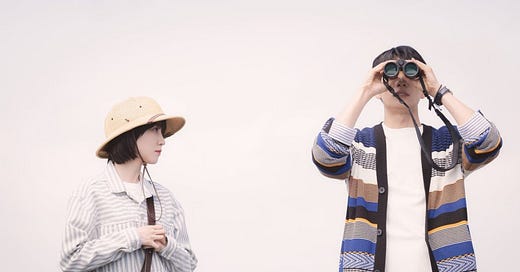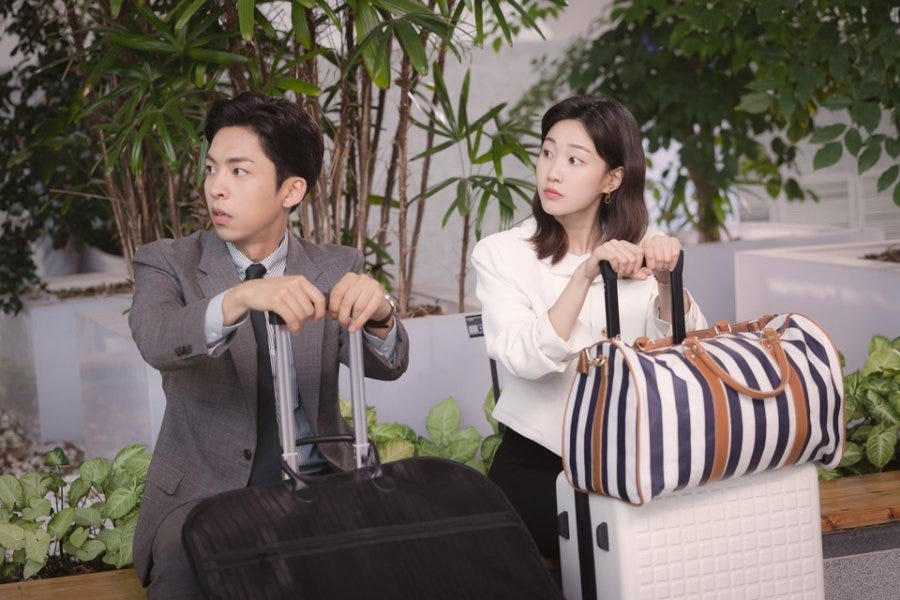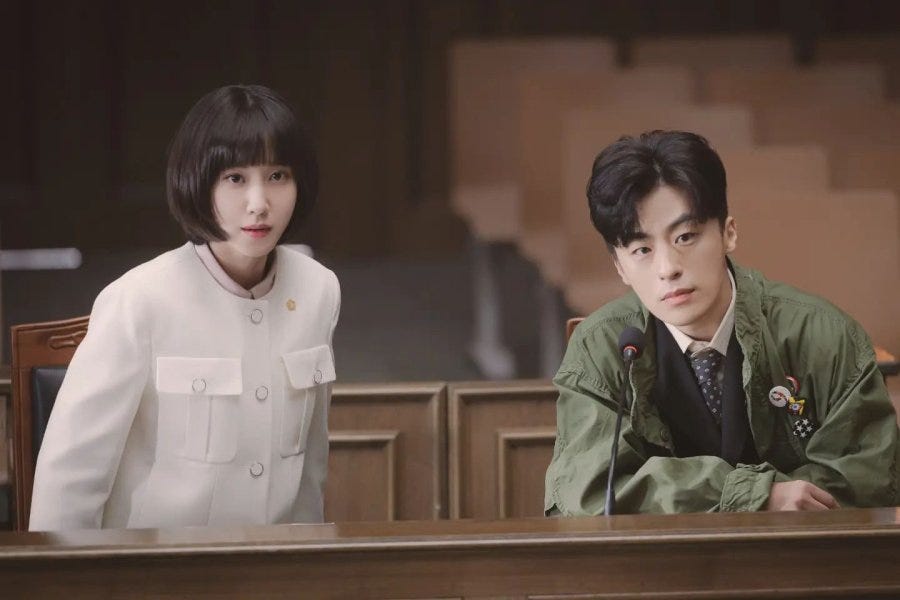Extraordinary Attorney Woo (2022) Final Remarks and a Critique
The curtain on the exploits of Attorney Woo Young-woo finally fell the previous week. For now at least, if rumours of another season are to be believed, it’s done and dusted. As someone who began enthusiastically on this journey with Woo Young-woo, I found my interest gradually waning as the show advanced into its second half. It’s not that I think it’s been a waste of my time. Not at all. The show clearly has its charms but at the end of it I’m left feeling somewhat dissatisfied, that unlike Woo Young-woo I don’t think it actually reaches its potential. I’ve been racking my brains trying to make sense of my own reaction because on paper all the ingredients are there for a good drama but I’ve come away with a partial conclusion that the show dips its toes in but never gets its legs wet, begging the question: How is that it’s both appealing and frustrating at the same time?
Initially I was wondering perhaps if the show was suffering from a case of identity crisis — of not knowing what it wanted to be and then trying to do too much with its given format but when I consider how the characters in particular have been used all throughout, I’ve come to the realisation that I’d perhaps given myself the wrong impression about the show from its inception and on hindsight I had not managed my expectations accordingly even when the cracks were already showing in Episode 6. Everything now in effect points to the fact that Extraordinary Attorney Woo is a piece of propaganda in its approach and foundation. It’s a well-made, entertaining piece of propaganda but it is propaganda nonetheless. It certainly goes a long way to explaining why the characters are oddly positioned all throughout the narrative. I use the word “propaganda” deliberately meaning that this show is first and foremost about the issues under scrutiny. It then follows that character development takes a noticeable backseat. The showcasing of various legal battles ultimately matter more in the mind of the writer while the characters are the vehicle, lenses, megaphone etc etc through which these social/political issues are examined or explored. In this framework Young-woo’s autism becomes the mechanism that locates her as an outsider among neural normals and designating her the dispassionate observer as it were looking in. For me it seems the characters are first and foremost mouthpieces for the writer’s agenda. All of this explains why a character like Jun-ho appears, disappears then reappears. The cycle is then rinsed and repeated. On paper there’s not a lot of him but it is to Kang Tae-oh’s credit that Jun-ho is so well-liked because of his charisma and nuanced performance. The script itself doesn’t do that much for him. It’s the same with Joo Jung-hyuk who plays Kwon Min-woo with his sudden change of heart and overnight transformation. He represents a type in the narrative and offers a particular perspective. He’s not a character that’s waiting rigorous development but does what the writer needs in a given episode which is why he comes across as a caricature. Of course the show has to pretend to give a reason why he changes so much and that’s where the secondary romance comes in — as the rationale for Min-woo’s swift transformation.
I think it’s true that the main romance, what little there is of it, is also written in service of the show’s mission to spread the message. Yes, it probably wants to promote the idea that autistic individuals have similar desires to pair up with others but I also think it provides opportunities for Woo-young to dig deep and “find herself”. It’s a way to round out her life experiences in these limited number of episodes. She’s not only developing professionally and morally but emotionally as well. Interacting with Jun-ho allows her to tap into another area of her humanity that she might not otherwise experience if there’s no love interest. Jun-ho is also presented as The Model (and Jung Myeong-seok to some degree) of how neural normals should treat vulnerable people that takes into account their dignity and humanity — an observation that accounts for his popularity.
This is not to say that no other Korean drama has never had ideological underpinnings but it’s more glaring in this because of how underdeveloped the characters are compared to many slice of life dramas. Koreans are very good at slice of life dramas and some of my favourites do the episodic or case of the week thing really well like Hospital Playlist, Prison Playbook, Racket Boys to name just a few. Racket Boys is particularly relevant as it does an especially great job of combining the coming of age aspects of an ensemble cast with an underdog triumphing sports theme.
The approach taken here is another issue. For me at least, the adventures of Woo Young-woo reads like a children’s storybook. I don’t mean that pejoratively because children’s books are creative products which often contain values that are held up as orthodoxy by the culture in which it is written but it does have ramifications for how the storytelling comes across to those who expect more on several fronts. By “more”, I would say a more substantial, nuanced examination of the core characters and their dynamic with the show’s protagonist and larger questions. Perhaps it’s because I happen to have attended a recent stage performance of Charlie and the Chocolate Factory that my thoughts went to Roald Dahl immediately especially after the episode about Mujin Academy and Bang Gu Ppong (Episode 9). This was a story that strongly featured the plight of children in South Korea who are depicted as being part of a flawed educational structure because they are little more than cogs in a machinery that drives the country’s economic engine. The character Bang Gu-ppong is a Pied Piper character who sparks a call to adventure to children closeted indoors because academic achievement becomes the sum of their existence. Although the show doesn’t entirely whitewash his “offence”, he is airbrushed into the canvas as a lone voice in the wilderness who has been compelled by a repressive society to takes drastic measures in order to make a point and make waves. He is a tragic hero co-opted for a political statement regardless of the optics of kidnapping children. The court case ends with him doing a Dead Poets Society impersonation in the courtroom with echoes of “O Captain, my Captain!” ringing in my ears. This impulse to simplify/ sentimentalize solutions is also seen in the lottery winners case where the “bad guy” in it gets his just desserts in a horrifying end so that the wife can get the money to raise their children. The same thing was also done with the mentally disabled young woman with a gigolo boyfriend.
The CGI whales, whale moments, humour, the sweet romance are all components of the packaging that this is an “adult” fairytale. It’s fluff on top with all kinds of messages underneath about problems in South Korean society. I contrast this with Juvenile Justice which was a series of stories about one single theme. Personally I’ve ended up appreciating Juvenile Justice more because it doesn’t take short cuts with the issues and the characters — it was raw, gritty and hard-hitting. It didn’t attempt to soften the edges of the cases or imply that solutions are fairly straightforward if only people joined hands and sang from the same song sheet. Even though both deal fundamentally with local issues, Juvenile Justice feels like a more authentic examination of the complex social issues that are under spotlight.
In the end what we’ve been given is a smorgasbord of ideas that are part of a (food) tasting expedition. That’s why I think many (myself included) are left feeling unsatiated. It’s like going shopping at Costco and going to all the food promotional booths and having little bites of morsels on offer. Depending on appetite and capacity, audiences will come away with various levels of satisfaction. On hindsight it shouldn’t have been a surprise that a show like this will end up dividing audiences.
When I think about the show in those terms, I find myself feeling less disappointed by the finished product but having far less attachment to it despite hoping that it was bound for greatness in those early days.






